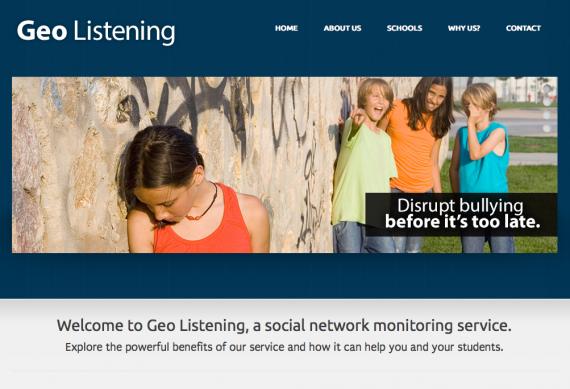NCAC has proudly signed onto the list of 13 Necessary and Proportionate principles, part of a global effort led by our friends at the Electronic Frontier Foundation, on mass surveillance. This week marks the one-year anniversary of the drafting of the principles. The list of principles proposes a set of guidelines that governments around the world should adhere to if employing surveillance technologies within their borders. In accordance with the eleventh principle, “the need to preserve the integrity of communications and systems”, we’re writing about the employment of surveillance technologies in public schools, an issue NCAC cares deeply about. We invite you to join the conversation online using the hashtag #privacyisaright. For other posts on this and other principles, visit http://necessaryandproportionate.org/anniversary.
In spring of 2013, Geo Listening, a software monitoring firm, picked up on a post from a teenager in Glendale, California who spoke of “ending his life” on social media. As part of a pilot program, the school district had paid the firm $5,000 to listen in on the social media conversations of over 9,000 students in the school district. After Geo Listening caught wind of the student’s suicidal thoughts, the school administration intervened, ultimately claiming that it saved the child’s life. Pleased with this outcome, the school district rewarded Geo Listening with $40,500 to monitor 14,000 middle and high school students’ activities on social media.
This precise train of thought – the notion that labyrinthine surveillance keeps kids safe – has fueled the employment of surveillance technologies in public schools. Last summer, in the wake of the Snowden revelations, the nation focused its attention on the NSA’s empire of mass surveillance. However, it’s necessary to acknowledge that the same attitudes fueling the NSA’s work – this territorial need to ensure our security, privacy be damned – have carried over to the local level.
Many schools have called upon surveillance technology companies to aid them in monitoring what students say. One of the most notable companies is Social Sentinel, a Vermont-based software technology company that’s supplying Smoky Mountain High School in Jackson County, NC with a “geo-fencing” tool. It’s a tool that scans social media accounts to look for indicators of threats to the school community, ranging from potential shootings to cyberbullying to drug use to suicide.
Oftentimes, partnerships like these end up being sweet deals for both parties. These private companies are supplied with the capital to keep their businesses thriving, consequently gaining access to the data of youth. In the name of safety, schools are given a chance to dip their toes into the lives of the kids they teach, perhaps imagining they’ll prevent another Columbine.
The catch? Schools, collecting sensitive information on their students, are consequently putting this private data in the hands of for-profit companies. Some communities, on the local and state level, are standing up. Last month, a bill attempting to curb schools’ abilities to retain personal information of students was passed in California. Likewise, The New York Times has listed a number of states who’ve passed legislation that bars their school districts from maintaining too much information about their students.
Beyond privacy, though, school-sanctioned surveillance can easily have chilling effects on student speech. It could lead to punishments for speech that’s harmlessly made in jest, such as the instance in which two Indiana teenagers were barred from extracurricular activities after being pictured holding phallic lollipops, or the one involving a Massachusetts teenager who faced suspension for tweeting the f-bomb to his high school’s Twitter account. As we’ve noted in the past, school policies on cyberbullying can also be grossly misinterpreted, leading to punitive action that denies students of their 1st Amendment rights.
Additionally, surveillance can facilitate an anxious culture of self-censorship. Youth – especially in places of learning – will feel as though their school is watching them constantly, on and off campus, whenever they post. Additionally, an awful lot of surveillance technology is inherently vulnerable due to overdependence on algorithms. These are algorithms “triggered” by buzzwords that may be contained in messages that are entirely innocuous. Such technologies present imperfect ways to map the emotions of teenagers.
The myriad problems plaguing American youth today – cyberbullying, violence, depression – don’t call for easy answers. Invasive surveillance, couched in a fervent need to protect our young, is one of those simple, one-off solutions that encroaches on the basic privacy rights of students. As mass surveillance continues to dominate our national conversation, NCAC hopes that public school districts will think twice about how their concerns for safety may threaten the 1st Amendment rights of students, too, especially when schools can infuse their digital learning initiatives with productive teaches on digital safety.


